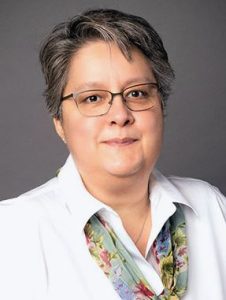Serving as chief of proton physics and associate chief of the medical physics division at Emory Proton Therapy Center keeps Katja M. Langen, PhD, busy.
Fortunately for the ABR, Dr. Langen finds time to help her field by serving as a volunteer for the past 13 years. She likes it so much that she’s part of committees for therapeutic medical physics computer-based and oral exams.

Her participation is especially valuable in a profession that’s mostly male. Female candidates are often relieved to see someone from their gender serving as an examiner. The ABR values diversity in race, gender, ethnicity, and career path (private or academic) amongst its volunteers.
“I’m always surprised by how many people approach me after the oral exam at (society) meetings,” Dr. Langen said. “They’re often women who tell me they were so glad that one of their examiners was a woman. They felt more at ease in that situation. It’s important that we try to mirror our examinees in terms of diversity.”
Her path to medical physics started in high school when she read a biography of Marie Curie, the radiology pioneer and two-time Nobel Prize winner. Curie’s influence is still felt across radiology; the Society for Women in Radiation Oncology in 2018 launched a now popular social media campaign called Women Who Curie Day to celebrate female accomplishments in the field.
“Her story got me interested in nuclear physics,” said Dr. Langen, who earned her master’s and PhD in medical physics at the University of Wisconsin. “It was impressive to see how she broke through gender norms in addition to facing multiple personal hardships to go abroad to study physics.”
Dr. Langen joined the Emory Proton Therapy Center faculty in 2019. She is one of many Emory staff who serve as ABR volunteers, and she sees their participation as helpful to both the ABR and their employer. The same goes for the approximately 1,200 other physicians and physicists who volunteer for the ABR.
“I encourage people to participate,” she said. “It’s good for them as well as their institutions.”
Dr. Langen said that teamwork has helped produce better oral exam content over the years. The feedback she has received from examinees has convinced her that the improvements have been effective.
“Last year after I examined, I came back home and the two folks from Emory who took it both agreed that it was fair and it was very relevant for a clinical medical physicist,” she said. “I thought that was a great compliment for the ABR.”
Like all ABR oral examiners, Dr. Langen has been on the other side of the table. Her experience of feeling apprehensive as a candidate inspired her to become a more empathetic examiner.
“We’ve all been there, so we know how nervous they are,” she said. “In that situation, sometimes you don’t get to the best knowledge. But if you can get people to calm down, they can give you the best of what they have to give.”
Volunteers have a strong support system, too. Whether they are developing content for initial or continuing certification exams or serving as oral examiners, they act as a team with ABR staff when meeting in person or giving remote oral exams.
“I’m very happy with the staff,” Dr. Langen said. “They’re always available and they’re always confident. You never feel like you’re alone on an exam day.”
Geoffrey Ibbott, PhD, is the ABR’s associate executive director for medical physics, a part-time staff position. A former volunteer, he’s happy to work with someone like Dr. Langen who excels at both writing and delivering questions.
“Dr. Langen brings to the ABR both her extensive medical physics knowledge and a calm, insightful demeanor,” he said. “Together, these make her an invaluable contributor to the development of the computer-based exams. They also make her an objective and considerate oral examiner whose patience and thoughtfulness help to relieve the stress many candidates feel. She is a model and inspiration for other examiners.”


